Imagine being a child diagnosed with Acute Lymphoblastic Leukemia, a type of cancer that affects the blood and bone marrow. The emotional and psychological impact this disease has on young minds is immense, as they grapple with fear, uncertainty, and the challenges brought about by treatment. In this article, we will explore the psychological effects of Acute Lymphoblastic Leukemia on children, shedding light on the difficulties they face and offering insights into how we can provide support and care during this challenging time.
Psychological Impact of Acute Lymphoblastic Leukemia on Children
Acute Lymphoblastic Leukemia (ALL) is a form of cancer that primarily affects children. It is a challenging and difficult disease to cope with, not only due to its physical implications but also the significant psychological impact it has on young patients. This article aims to explore and discuss the various ways in which ALL can affect the emotional, cognitive, social, family, and school life of children. It will also delve into the psychological aspects of treatment-related anxiety, depression and anxiety, post-traumatic stress disorder, body image and self-esteem issues, and coping mechanisms.
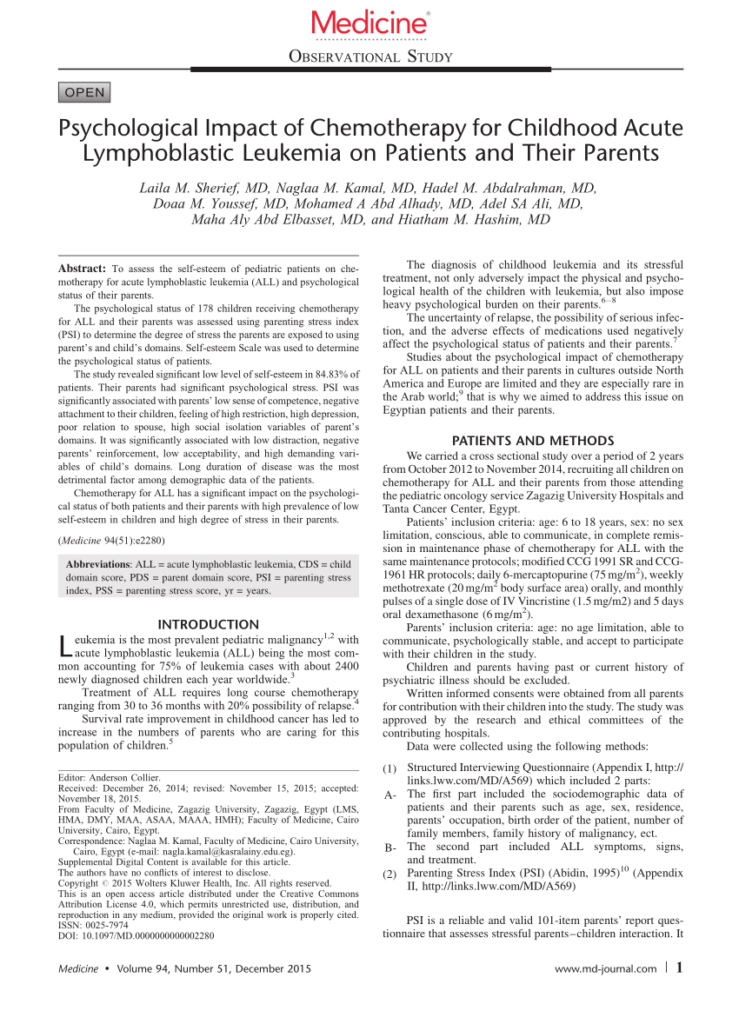
Emotional Impact
Receiving a diagnosis of ALL can be overwhelming for children and has a profound emotional impact on their well-being. Fear, sadness, and uncertainty are common emotional responses that surface upon learning about the disease and its potential consequences. Children may struggle with feelings of being ‘different’ or ‘abnormal’, which can lead to a sense of isolation and emotional distress. The emotional impact of ALL is further deepened by the need for frequent medical interventions, such as chemotherapy, hospital stays, and the possibility of complications. It is crucial to acknowledge and address these emotions to ensure that children receive the necessary support to navigate through this difficult journey.
Cognitive Impact
ALL and its treatment can have a significant cognitive impact on children. The intensive medical interventions, such as chemotherapy and radiation, can cause cognitive impairments, commonly referred to as ‘chemo brain.’ Children may experience difficulties with memory, attention span, and concentration, affecting their overall cognitive functioning and academic performance. Additionally, the emotional distress associated with the disease can further impede cognitive processes. It is essential for healthcare providers and educators to understand these cognitive challenges and provide appropriate adjustments and support to facilitate the child’s cognitive development and educational progress.
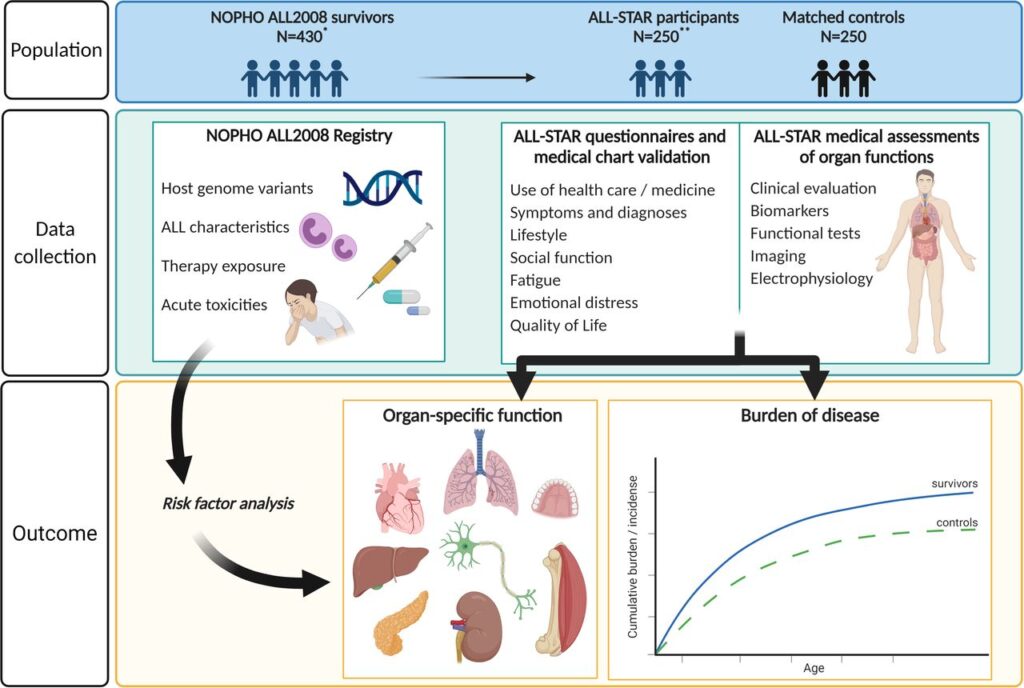
Social Impact
Dealing with ALL can profoundly affect a child’s social life. The physical limitations imposed by treatment, such as weakened immune systems and physical changes, may lead to reduced social interactions with peers. Children may struggle with maintaining their pre-diagnosis friendships, as their energy levels and ability to participate in social activities may be compromised. Moreover, the fear of being stigmatized or ostracized due to their illness can lead to social withdrawal and feelings of loneliness. It is crucial to create supportive environments that foster inclusivity and understanding for children with ALL, enabling social interactions and helping them maintain a sense of belonging.
Family Impact
The impact of ALL extends beyond the affected child; it greatly influences the entire family dynamic. Parents and siblings may experience high levels of stress and anxiety related to their child’s illness. The emotional and financial strain of medical treatments, the need to balance caregiving responsibilities, and the uncertainty of the disease’s outcome can create immense pressure within the family unit. It is vital for families to seek support, both from healthcare professionals and support groups, to navigate through these challenges and strengthen their coping strategies.
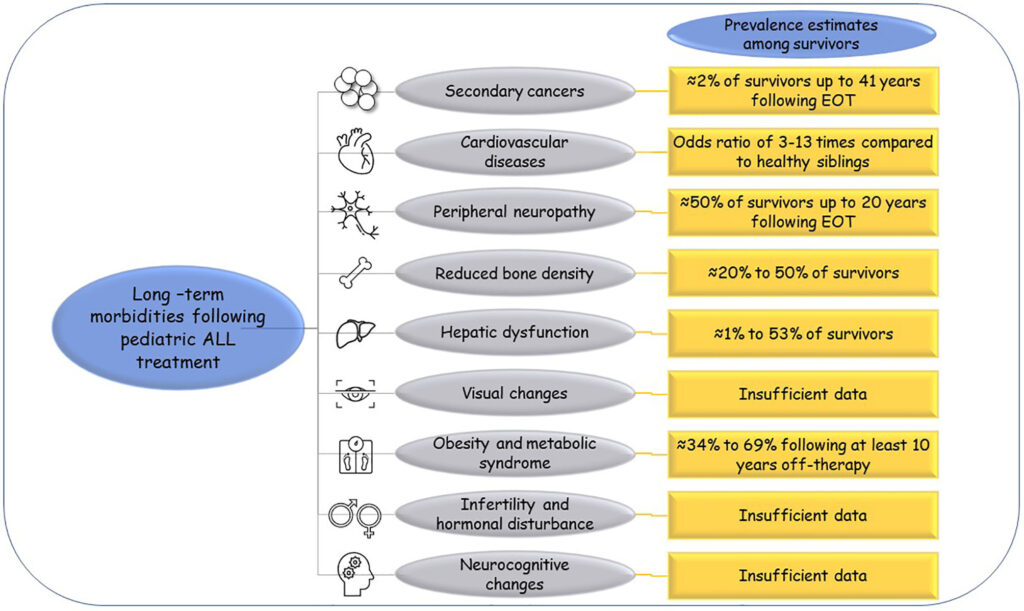
School Impact
ALL can significantly impact a child’s educational journey. Frequent hospitalizations and missed school days can lead to academic setbacks and difficulties. Children may struggle to keep up with their peers and experience feelings of frustration and inadequacy. The cognitive impairments caused by treatment and associated emotional distress can present further obstacles to learning. It is crucial for schools to implement supportive measures, such as individualized education plans (IEPs) and accommodations, to ensure that children with ALL receive the necessary academic support and opportunities for successful educational outcomes.
Treatment-related Anxiety
The nature of ALL treatment often involves invasive medical procedures, such as lumbar punctures and bone marrow aspirations, which can induce significant anxiety and distress in children. The fear of pain, discomfort, and unfamiliar environments can heighten treatment-related anxiety. It is essential for healthcare providers to employ strategies to alleviate anxiety, such as providing child-friendly explanations, involving the child in decision-making, and utilizing distraction techniques during procedures. Addressing treatment-related anxiety is crucial not only for the child’s well-being during treatment but also to foster a positive attitude towards medical care in the future.
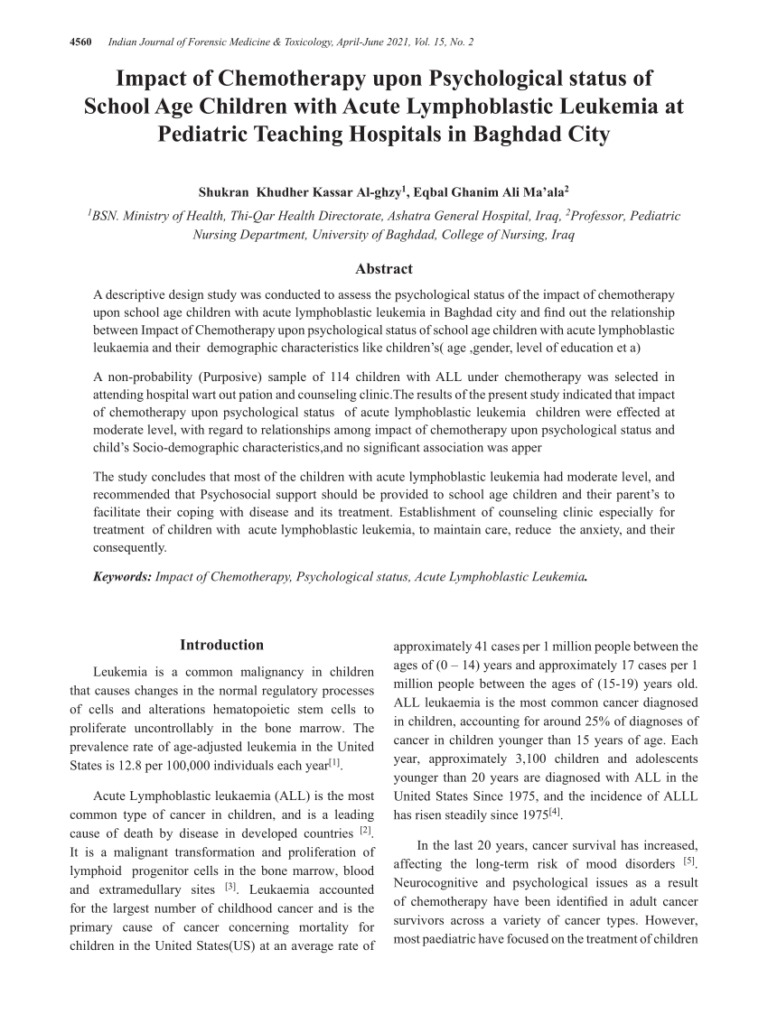
Depression and Anxiety
Children with ALL are at a higher risk of developing depression and anxiety disorders compared to their healthy peers. The emotional toll of the disease, coupled with the physical symptoms and disruptions to everyday life, can contribute to the development of these mental health conditions. It is crucial for healthcare providers to be vigilant in assessing and addressing signs of depression and anxiety in children with ALL. Early intervention, counseling, and appropriate therapies can help manage and alleviate these mental health challenges, promoting overall well-being.
Post-traumatic Stress Disorder
The experience of ALL, including the diagnosis, treatment procedures, hospital stays, and the fear of potential relapse, can induce post-traumatic stress disorder (PTSD) symptoms in children. Flashbacks, nightmares, and hypervigilance are some of the common symptoms of PTSD that might develop in children with ALL. It is essential for healthcare professionals to provide trauma-informed care and support, utilizing interventions such as cognitive-behavioral therapy (CBT) to address and manage PTSD symptoms effectively.
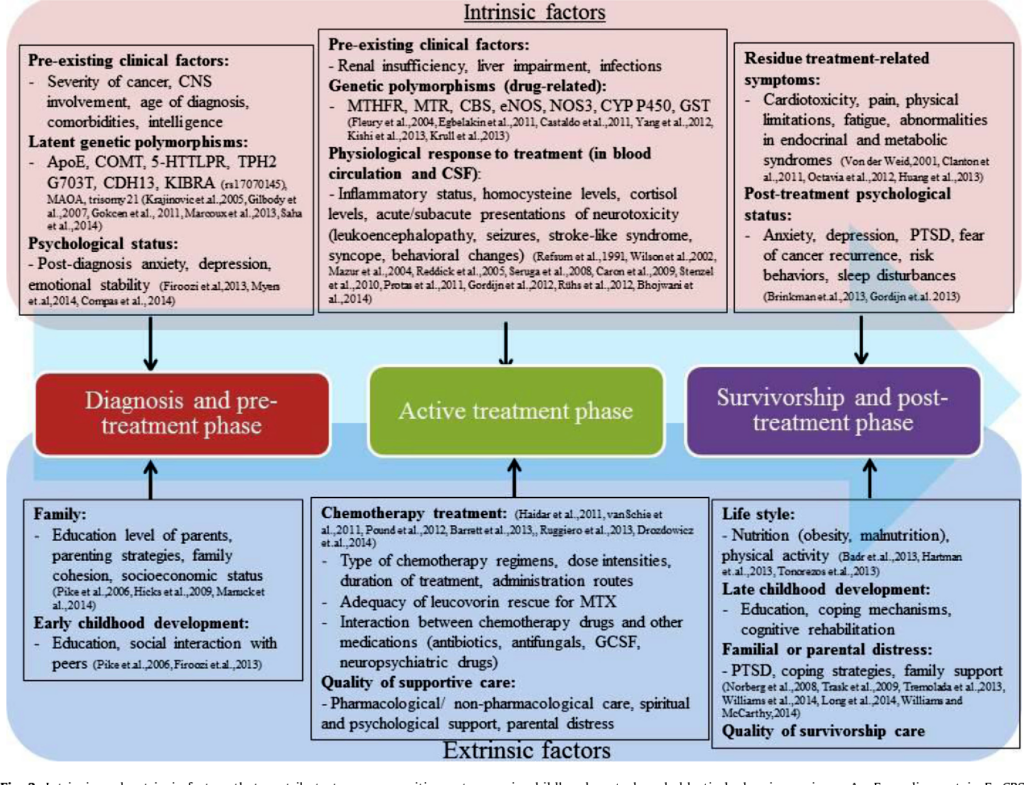
Body Image and Self-esteem
ALL and its treatment can cause physical changes in children, such as hair loss, weight fluctuations, and scars from surgeries. These alterations in appearance can negatively impact a child’s body image and self-esteem. Feelings of self-consciousness, embarrassment, and the fear of being perceived as different can emerge, affecting the child’s overall self-worth and confidence. It is crucial for healthcare providers, alongside psychologists and support teams, to prioritize addressing body image and self-esteem issues, providing counseling and support to help children develop a positive body image and healthy self-esteem.
Coping Mechanisms
Coping with the challenges of ALL requires the development of effective coping mechanisms for both children and their families. Education, counseling, and support groups can equip families with strategies to navigate the emotional, cognitive, and social impact of the disease. Encouraging open communication within the family and seeking professional support when needed can help alleviate stress and promote resilience. For children, age-appropriate coping strategies, such as engaging in creative activities, journaling, and relaxation exercises, can be beneficial in managing the emotional and psychological aspects of living with ALL.
The psychological impact of Acute Lymphoblastic Leukemia on children is vast and multifaceted. The emotional, cognitive, social, family, and school impacts, along with treatment-related anxiety, depression and anxiety, PTSD, body image and self-esteem issues, and coping mechanisms, all contribute to the challenges faced by children with ALL. Recognizing and addressing these psychological aspects is vital in providing comprehensive care and support for children and their families as they navigate the complexities of this disease.
Watch This Video Below
Related Terms About Psychological Impact of Acute Lymphoblastic Leukemia on Children
Acute Lymphoblastic Leukemia Adverse Effect, Acute Lymphoblastic Leukemia Effect On The Body, Acute Lymphoblastic Leukemia Treatment Side Effects, Impact Of Acute Lymphoblastic Leukemia Treatment, Long Term Effects Of Acute Lymphoblastic Leukemia, Side Effects Of Acute Lymphoblastic Leukemia, What Are The Long-term Effects Of Leukemia, What Does Acute Lymphoblastic Leukemia Do To The Body